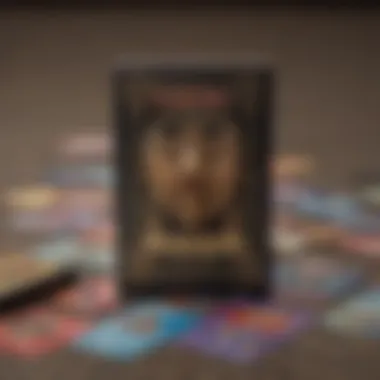A Comprehensive Guide to Yu-Gi-Oh Card Value Lookup


Intro
When it comes to Yu-Gi-Oh cards, the value can often seem obscure. Factors such as rarity, card condition, and market demand play significant roles in determining the prices players and collectors might expect. In this article, we aim to demystify the process of assessing Yu-Gi-Oh card values through various lenses, critically enhancing the understanding needed for both new and seasoned enthusiasts in this field.
Overview of the Topic
Yu-Gi-Oh card value lookup involves evaluating cards to ascertain their monetary worth. This practice holds great importance for players seeking optimal trading opportunities, collectors aiming to expand their collections wisely, and investors looking to enter the market.
- Definition and importance of the topic: At its core, understanding card value is crucial for anyone involved with Yu-Gi-Oh. An accurate valuation can elevate one's collecting experience, ensuring informed purchasing and selling decisions.
- Key benefits and implications: Knowing the value of cards fosters greater engagement in the Yu-Gi-Oh community. It also aids individuals in protecting their investments and understanding market trends. As a result, enthusiasts can navigate fluctuations with more confidence.
Exploring Strategies and Tips
To maximize success when assessing card values, certain strategies might be employed. An effective approach not only simplifies the discernment of worth but can also bolster overall trading proficiency in Yu-Gi-Oh.
- Research: Leverage resources like online marketplaces and databases. Websites like TCGPlayer and Cardmarket often reveal accurate current market prices.
- Rarity Considerations: Familiarize yourself with the Rarity symbols found on cards. Those that are Limited Edition or Ultra Rare typically command higher values compared to common cards.
- Card Condition: Examine the physical condition critically. Cards labeled as Mint or Near Mint tend to attract better prices.
By implementing these strategies, one can create a nuanced understanding of market behavior.
Case Studies and Examples
Analyzing real life instances provides clarity and insight into the valuation landscape. For example, a rare card from the original set can experience significant price appreciation due to nostalgia and demand.
Prolusion to Yu-Gi-Oh Card Value
Yu-Gi-Oh card value is a crucial subject for collectors and players alike. Understanding why certain cards are valued more than others can help guide meaningful collecting strategies and investment decisions. This section will explore historical context and demonstrate why knowing a card's value is essential when considering buying, selling, or trading.
Historical Context of Yu-Gi-Oh
Yu-Gi-Oh, created by Kazuki Takahashi, emerged in the late 1990s, rapidly transforming from a simple manga into a widespread global phenomenon. The game emphasizes strategic gameplay, attracting a diverse audience over decades. As popularity soared, so did the demand for unique cards, leading to a burgeoning secondary market where card values would begin to gain significance.
The unique qualities of the game, including distinct card designs and stories behind each character, influence valuations significantly. Rare and out-of-print cards often hold higher value compared to more recent releases. Hence, being aware of its historical context is invaluable for collectors who wish to navigate the dynamic landscape of Yu-Gi-Oh card trading efficiently.
Importance of Card Value in Collecting
Understanding card value holds multiple benefits for both serious collectors and occasional players. First, it informs purchasing decisions. Knowing that a Kickfire Deck Fission Yu-Gi-Oh card has high market demand helps in making wiser buying choices just like learning nearly iconic cardslike Blue-Eyes White Dragon increase awareness on potential profit.
Additionally, knowledge of card value allows effective trading strategies. This is pivotal for maintaining a diverse and desirable collection. For example, if two players are trading, understanding each card's worth creates a fair deal that satisfies both parties.
Finally, card values often reflect broader market trends within the sporting game community. Cards fluctuate in value due to varying factors such as conditions and tournament scene. For fans and investors looking to safeguard their collections or capitalize on trends, grasping these variables is essential.
"Knowledge is power, especially when it involves investment potential within buzz-worthy markets like Yu-Gi-Oh fatigued by majority of us greedily alining short-term propositions."
Key Factors Influencing Card Value
Understanding the key factors that influence card value is essential for both collectors and players of Yu-Gi-Oh. This knowledge not only helps in assessments of the cards but also supports informed decision-making for transactions. Factors such as rarity, condition, market trends, and the specific sets contribute significantly to the valuation of a card. Recognizing these factors enables collectors to prioritize their purchases and sales, fostering a more strategic approach to the hobby as a whole.
Rarity and Availability
Rarity is one of the principal elements determining a Yu-Gi-Oh card's value. Cards classified as Ultra Rare, Secret Rare, or quite simply any variant not widely circulated usually command more attention and a higher price in the market. For example, promotional cards issued in limited editions can substantially appreciate in value since they attract collectors wanting unique additions.
The availability of cards also impacts their value. A card that is abundant may have little economic worth, while one that is difficult to find can price more than many standard offerings. This distinction is crucial, as some collectors are specifically targeting hard-to-find pieces for their collections.
Condition of Cards
Condition plays a pivotal role when determining the card’s price. Generally, cards can be categorized as Mint, Near Mint, Lightly Played, Moderately Played, or Heavy Played. Mint condition cards, which show no signs of wear or damage, can fetch considerably more than cards in lesser condition. Collectors are advised to pay close attention to factors like scratches, bends, and discoloration, all of which can detract from a card's valuation.


Moreover, graded cards receive a score from professional grading services. These grades often provide buyers with an assurance of the card's condition, further validating its market value. A perfectly preserved card graded as Gem Mint by PSA or Beckett can command remarkable prices.
Market Trends and Demand
The financial aspect tied to market trends and demand fluctuates as new sets are released and as specific cards gain or lose prominence in competitive play. You may see spikes in prices due to play strategies or recent tournament results that highlight particular cards. Collectors often pursue cards that align with current high-demand archetypes and game dynamics.
Tracking these shifts can be done through community forums, auction platforms and dedicated Yu-Gi-Oh market analysis tools. Awareness of trends helps one buy cards ahead of peaks in demand.
Card Sets and Series Impact
Card sets often dictate perceived value. Effectively, the context from which the card originates can heavily weigh into its current worth. Classic sets such as Legend of Blue Eyes White Dragon often resonate with nostalgia, attracting buyers who value them more than newer alternatives. Alternatively, the Yugioh 2023 TCG set may fluctuate in price until the card list holds significance in collectibles and competitive viability.
Correlation too exists between set release schedules and collectible value. Recognizing which sets are soon to exit print can guide intelligent purchasing and strategic arithmetic for budget-conscious collectors.
The valuation journey for Yu-Gi-Oh cards isn't merely about that piece of cardboard; appreciating the nuances unlocks greater financial insight and investment potential.
Understanding these key factors—rarity, condition, market trends, and figures within sets—provides significant insights for collectors making focused and informed decisions.
Methods for Card Value Determination
Determining the value of Yu-Gi-Oh cards is a crucial capability for collectors and players alike. This knowledge allows individuals to make informed decisions when buying, selling, or trading cards. Proper evaluation contributes to successful financial decisions in the realm of collectibles. Moreover, understanding the different methods to assess card values ensures engaged users benefit more from their collections. The following sections discuss key methodologies to accurately determine Yu-Gi-Oh card values.
Online Price Guides
Online price guides act as a significant resource for Yu-Gi-Oh card valuation. These platforms provide estimated market values based on recent sales, giving users a reliable benchmark. Well-known price guides like TCGPlayer allow users to search specific cards to gain insights into their worth. This helps collectors stay informed on value trends and changes over time. Furthermore, these guides are usually updated regularly, reflecting the latest sales and market dynamics.
When using online price guides, it is essential to note that values are primarily estimates. Several factors can influence the final selling price, including seller reputation and timing. It is wise to check multiple sources before making any buying or selling decisions to get a comprehensive view.
Auction Platforms Analysis
Analyzing auction platforms plays a fundamental role in tracking card values. Websites like eBay facilitate access to real-time sales information, showing actual transaction prices for Yu-Gi-Oh cards. This can indicate what buyers are currently willing to pay. Auletters also reveal information about condition impacts on the pricing. For instance, listings with high engagement are crucial signals of demand intelligence in determining worth.
However, auction platforms can exhibit volatile prices. Bidders competing for valuable cards may inflate the final price significantly. It is productive to look beyond just the winning bids by examining completed listings for a more accurate value assessment, considering both high-end and low-end results.
Community and Forum Insights
Community insights from forums and discussion platforms contribute to card value determination. Sites like Reddit and various collector forums have members who share experiences, insights, and opinions on card markets. Engaging with these communities provides useful qualitative data and specific examples of value changes.
It's important to validate the sources within these forums since the perspectives may vary greatly. However, discussions around trending cards or value spikes can offer proctive hints. Popular threads can sometimes forecast rising values, allowing collectors to catch changes early. Regular acknowledgment of these discussions thrives insights while providing networking opportunities among fans navigating the same interests.
The wisdom shared in community discussions enhances comprehension for both new and experienced players. Listen and calibrate your strategies as opinions develop over time.
Tools for Yu-Gi-Oh Card Value Lookup
In the pursuit of accurately valuing Yu-Gi-Oh cards, utilizing the right tools is crucial. Access to effective resources not only streamlines the valuation process but also enhances the authenticity of findings. This section reviews various tools available to help identify and assess card value efficiently. Choosing the right tool can significantly impact one's ability to maintain a competitive edge in the ever-evolving card market.
Mobile Applications
Mobile applications providing card value insights have become vital in today's fast-paced digital environment. Apps like YuGiOh Card Database and TCGPlayer serve as comprehensive resources for collectors and players alike. They offer features such as scanner functionality, allowing users to take a photo of a card, which triggers a result with current market ratings.
Some additional advantages include:
- Real-Time Updates: These apps often update prices and trends frequently, keeping users ahead of market shifts.
- User-Friendly Interface: Many applications focus on simplicity, making it easier for less experienced individuals to engage with card valuation.
- Database Access: Users gain instant access to detailed information regarding card rarity, history, and value trends without extensive searches.
Overall, mobile applications empower card enthusiasts to assess values on the go, making informed trading and collecting more achievable than ever.


Database Websites
Database websites play a significant role in offering consolidated information in one accessible location. Most prominent is TCGPlayer.com which provides users a means to check up-to-the-minute prices based on live marketplace data.
Websites generally showcase the following key aspects:
- Comprehensive Lookups: They often include both historical and current prices along with helpful guides on how vales fluctuated over time.
- Community Contributions: Database platforms often feature user-uploaded content providing further insights and validations related to rarities.
- Detailed Listings: Most databases include expansion sets details, providing context for how specific cards rank within that set.
Utilizing these database websites ensures that collectors have access to valuable and easily digestible data regarding their cards.
Social Media Platforms
Social media platforms can be a treasure trove of information and insights concerning Yu-Gi-Oh card values. Engaging in groups or forums on Reddit, Facebook, and similar sites offers users both vast knowledge and real-time updates from fellow enthusiasts and collectors.
Key points about this tool include:
- Community Knowledge: Many collectors share their own experiences, values, or trades, providing insights better than numerical data alone can offer.
- Trends and Rumors: Social interactions within these communities can indicate forthcoming trends or anticipated changes within the market.
- Easy Interaction: Users can quickly clarify doubts with other members, thus getting immediate feedback regarding specific value concerns.
Thus, leveraging the information shared on social media platforms enriches a collector's view of their holdings beyond pure numeric value and helps stay connected to community knowledge.
Practical Steps for Card Value Lookup
Evaluating the worth of Yu-Gi-Oh cards requires a systematic approach. This section outlines the practical steps to determine your card values effectively. The process addresses key elements, providing benefit to collectors and investors alike. Improving valuation accuracy fosters informed decisions, something crucial for anyone engaged in buying, selling, or trading. Therefore, engaging in these conscious practices offers numerous advantages.
Identifying Your Cards
The first and most essential step in the card value lookup involves accurately identifying each card in your collection. Every series and set contains cards characterized by unique attributes. You can begin by examining the name, card number, and set symbol usually found at the bottom of each card. Every element matters.
A clear understanding of the specific card is vital. That ensures that you seek its current market value accurately. Cataloging multiple cards helps streamline the process later on. Such organization may also highlight cards that require careful attention due to subjective value or rarity.
Gathering Relevant Information
Once you have established the key identifying details of your Yu-Gi-Oh cards, the next step is gathering additional information. This often includes:
- Current Market Trends: What is the recent selling price within various platforms?
- Card Condition: Is your card in mint, near mint, or damaged condition?
- Rarity and Demand: Generally, enhanced rarity leads to higher demand, which in turns affects the price.
Utilizing resources allows you to maintain your understanding of the current market values. Online price guides, as well as auction sites, represent excellent starting points for primary research. Serious collectors must assess and follow the market periodically. Familiarity with these evolving dynamics attributes to a student of the hobby.
Cross-Referencing Values
Cross-referencing information connects the dots across your gathered data effectively. Checking values across multiple platforms eliminates bias from singular websites. Use at least three reputable sources for verification; this includes online price guides, popular auction websites, and active online collectible marketplaces.
Having varied sources fosters a broader, more nuanced understanding. The fluctuation of value over time often depends on specific market behaviors. Hence, confirming info prevents any miscalculations or hasty decisions that may regrettable in later selling.
Cross-referencing helps exihibit a more accurate portrayal trickling down to the card’s perceived worth in the myriad communities engaged in trading.
Common Misconceptions about Card Values
Understanding the truth behind card values is important for collectors and players. This and eliminates confusion during card trading or sales. The misconceptions can lead to poor decisions. It influences the perspective on what a card is worth. In this section, we will focus on two significant misunderstandings: Value vs. Sentimental Worth and Short-Term Gains vs. Long-Term Investment.
Value vs.
Sentimental Worth
One significant misconception among collectors is the difference between value and sentimental worth. The market value is what buyers are willing to pay based on various factors. This includes** rarity**, condition, and demand. Concurrently, sentimental worth is personal and emotional. A specific card may hold deep meaning or memories for a collector.


For example, a card that once belonged to a friend or represents a pivotal moment in a player's life might be priceless to them. This does not adequately reflect cash value in the market.
Collectors should know that while sentimental value can influence how much they care for a particular item, it does not materially impact the cash that can be exchanged for trading. Educating the difference can help avoid disappointment when trying to sell or trade a well-loved card.
- Value is objective, reflecting market conditions.
- Sentimental worth is personal and subjective.
- Knowing these differences can lead to better choices in sales or trades.
Short-Term Gains vs.
Long-Term Investment
Another prevalent misconception relates to the understanding of short-term vs. long-term investments in Yu-Gi-Oh cards. Many players think they can achieve quick gains by trading and flipping cards. While this can happen, it is often unpredictable. Cards values fluctuate, influenced by overall demand and market conditions. Additionally, players may see traitors earning quick profits but do not notice their inconsistency.
To make reliable returns, it is more beneficial to think in longer timeframes. Collectors will notice that as nostalgia grows around specific sets, their values will often appreciate significantly over time. Allocating funds into cards viewed with enduring interest can yield better returns. Therefore, consider the following:
- Analyze trends instead of making guesses.
- Research card rarity and long-holding qualities.
- Understand that patience is crucial.
The point is clear: educated and calculative engagements in the card market lead to sustainable returns over societal interests.
Maintaining a Yu-Gi-Oh Card Collection
Maintaining a Yu-Gi-Oh card collection is an essential aspect of being a collector and player. It goes beyond just enjoyment; it significantly impacts the card's value and presentation. Consideration of storage methods, evaluations, and trading skills plays a fundamental role in preserving the collectible aspect of the cards. Keeping your collection in good condition can make a critical difference in value appreciation over time, as demand often connects closely to the physical state of cards.
Proper Storage Techniques
Storage techniques can greatly influence the longevity and condition of Yu-Gi-Oh cards. Incorrect storage can lead to wear and damage, which can diminish their value significantly. Here are some effective storage methods:
- Use Sleeves: Always place your cards in protective sleeves. This helps to shield them from scratches and moisture. Investing in high-quality sleeves is recommended.
- Binders or Boxes: Store the cards in appropriate binders or boxes specifically designed for trading cards. This prevents bending and makes it easier to organize your collection.
- Avoid Direct Light: Keeping cards away from direct sunlight can protect them from fading. Ideally, store them in a cool, dry place where temperature fluctuations are minimal.
Developing a routine for organizing and storing the collection ensures you will not lose track of valuable cards.
Regular Value Assessment
Conducting a regular assessment of your card collection helps keep you informed about changes in market value. Knowing the current worth of your cards can also guide whether to sell or hold onto them. This evaluation involves:
- Monitor Trends: Regularly check online platforms and auction sites for price fluctuations. Understanding market trends is essential to determining if your assets are appreciating or depreciating.
- Review Condition: Reassess the condition of cards from time to time. Elements like curling, scratching, or markings must be recorded honestly. This understanding of physical condition directly contributes to valuation.
- Historical Data: Tracking the prices you found in previous assessments serves as a useful reference. It might help identify patterns regarding price movement.
Establishing a periodic review schedule strengthens its significance in your overall strategy for maintaining a solid collection.
Selling & Trading Strategies
Selling and trading can either deepen or break your connection to card collecting, depending on your approach. A strategic mindset is crucial:
- Expect Fair Prices: Always learn the market values to avoid underselling. You need to know the demand for your cards and their typical selling points, which can vary over time.
- Networking with Other Collectors: Engage with fellow collectors on platforms like Reddit or various forums. Building relationships can open opportunities for mutually beneficial trades.
- Leverage Social Media: Promote your cards on platforms like Facebook groups dedicated to trading card games. This allows access to a broader audience that may be actively seeking specific cards.
Utilizing careful strategies for selling and trading can ensure you get the best value from the cards, keeping you engaged with other like-minded traders.
Conclusion: Effective maintenance of a Yu-Gi-Oh card collection is far more than mere storage. It encompasses a spectrum of distinct practices ranging from proper handling to insightful market analysis, subsequently enriching the collecting experience and supporting potential investment gains in the future.
Finale
In this article, we have explored the crucial aspects of Yu-Gi-Oh card valuation, emphasizing how significant it is for both casual players and serious collectors.
Understanding the value of your cards serves multiple purposes, such as making informed selling or trading decisions, preserving investments, and knowing how to enhance your collection strategically.
Recap of Key Points
- Rarity and Availability: These factors greatly determine the market value, influencing how much collectors are willing to pay.
- Condition of Cards: A card's physical state is paramount. Mint cards fetch higher prices.
- Market Trends and Demand: Keeping an eye on current demand can provide insight into potential future valuations.
- Tools and Resources: From mobile applications to online market analysis, various platforms are available that streamline value assessments.
- Common Misconceptions: Recognizing the difference between sentimental value and actual market worth is essential for accurate valuation.
Final Thoughts on Card Value Lookup
As the Yu-Gi-Oh trading card game persists through generations, creating interest among diverse age groups, understanding card value becomes ever more significant. Evaluating your collection involves recognizing trends, staying informed, and using resources effectively. It’s not just about buting and selling; it's also about engagement in a collective culture where knowledge is power. Adjacent to the potential profits resides anecdotal value that connects you with an experienced community.
Ultimately, power professional, informed decision-making—for collectors and investors alike—emerges as key to navigating the Yu-Gi-Oh card landscape.



